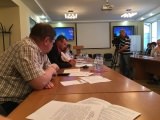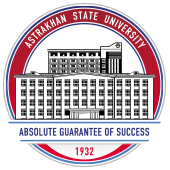Developing Russian-Iranian Relations
 20.05.2016
20.05.2016
On May 18, 2016, the roundtable “Role of Astrakhan Region in Russian-Iranian Relations” took place at Astrakhan State University.
The event was arranged by the Center of Eurasian Political Research of ASU; it was backed by the Astrakhan Regional Public Organization of Iranian Culture “Teheran”.
Astrakhan Region has always played an important role in establishment and development of relations between Iran and Russia. Since the 16th century, Astrakhan has been paying a lot of attention to its versatile links and contacts with Iran. Our city has always been a most important strategic area to spread Russian influence upon the Caspian littoral region.
In early 1990s, new independent countries emerged at the Caspian Sea. Astrakhan Region became Russia’s southern outpost at the border between Europe and Asia, which provided favorable conditions for dynamic development of its transportation facilities. It has become the center of the present-day dialogue between Russia and Iran. Versatile links and contacts (first of all, in education, in trade and in economy, in culture and in social relations) were established between the two countries. This cooperation is now undergoing a stable growth on a mutually beneficial basis.
Ms. Larisa Eldysheva, Deputy Chief of the Internal Policy Directorate of the Administration of Astrakhan Region’s Governor, started the discussion; she emphasized importance of such events and remarked that Astrakhan Region has always highly appreciated its partnership relations with the Islamic Republic of Iran.
Mr. Hadad Yahya Mehdi, Chairman of the Astrakhan Regional Public Organization of Iranian Culture “Teheran”, also pointed out that Astrakhan Region was a connecting link between the two Caspian littoral countries throughout many centuries.
Dr. Vladimir Kulakov, an Associate Professor of ASU, told about the establishment and development of relations between Russia and Iran via Astrakhan. In particular, he remarked that a numbers of tasks was set for top officials of Astrakhan Region; those tasks aimed to provide the most favorable and comfortable conditions for Iranian citizens in our Region.
Prof. Anna Romanova, Director of the Institute of Humanities of ASU, presented the monograph “Astrakhan – Guilan in History of Russian-Iranian Relations” written by a whole team of researchers; she emphasized the necessity to publish more works in this theme.
Dr. Anna Voronova, an Associate Professor of ASU, concerned the role of Astrakhan in trade and economic relations between Astrakhan and Iran. To continue this theme, Mr. Vladislav Kondratyev, a well-known Astrakhan journalist and political observer, analyzed the role of Astrakhan in the development of the North–South Transport Corridor.
Dr. Andrey Syzranov, Chief of the Center of Eurasian Political Research, paid the participants’ attention to the fact that the Supreme Eurasian Economic Council (the supreme authority of the Eurasian Economic Union) set the task to initiate consultations with the Iranian party to sign a temporary agreement concerning the free trade zone.
Dr. Alexander Vassilyev, a political observer, emphasized the role of information exchange in the development of business cooperation between Russia and Iran. In his opinion, it is necessary to use media to maintain diplomatic relations between our countries.
Mr. Sergey Lvov, Deputy Chief of the International Division of the Ministry of International and Foreign Economic Relations of Astrakhan Region, suggested that the Iranian party established a number of joint TV projects about the role of Iran in the history of Astrakhan and vice versa.
Dr. Sergey Novosyolov from the Chair of Political Science & International Relations of ASU forecasted geopolitical aspects of Iran’s current foreign policy.
At the end of the roundtable, a resolution was approved. The resolution emphasized that the roundtable should initiate regular expert meetings that would concern relations between Russia and Iran. It is necessary to maintain further expert interaction between Russian and Iranian regions to develop common approaches to assessing viable areas of the bilateral dialogue.


.jpg)
.jpg)
